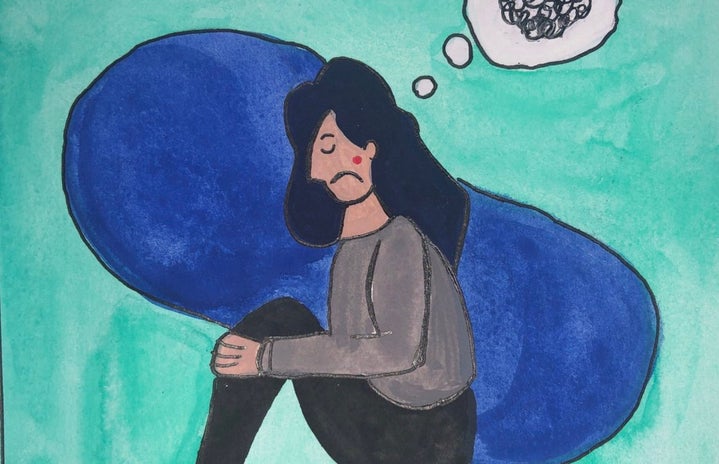Edited by Vanishree
With the pandemic looming over everything, we’ve all seen a general increase in anxieties. Unfortunately, none of us are equipped to deal with them and often end up saying things that are meant to be comforting but prove unhelpful. As such, two people with anxiety try to give you some tips using our experiences with it. Naturally, anxiety is a personal experience and, so, the views in this article are subjective.
A “To Don’t” List of Things (probably) Not To Say:
1. “Don’t overthink it.”
This is by far the most common thing to say but here’s the thing: overthinking is not a choice. No one faces an issue and thinks “hey, this seems interesting, I’ll let this occupy my brain for the rest of my day and not get anything done, sounds fun!” Telling someone to stop overthinking is almost like telling someone with breathing problems to just breathe. Understand that no one purposefully overthinks, hell, anxiety in itself is not purposeful. So, when you’re spiraling, the last thing you want to hear is, don’t overthink it. It is not something that can be controlled, it is not a choice and it is not something that can be stopped that easily. More often than not, the person just needs to get it out of their system until all is laid out and then, perhaps you can find a way to comfort them.
2. “It’s all in your head, there’s nothing to worry about.”
Of course, anxiety is all in our heads. Why does this mean that it should be something we ignore though? Most people with anxiety are aware that the thoughts they are having are somewhat strange or irrational, but that does not make them any less real. Dismissing the anxious thoughts isn’t going to make them go away. You have to treat them as real because they are the painful reality of people with anxiety.
3. “It’ll be okay.” / “It’ll pass.”
You mean well. But you see, the issue here is, an anxious person is very, very unlikely to believe that it will, indeed, be okay. Because, firstly, it is not something that you can guarantee –– it is not something that is certain. When one is worried about, say, an assignment grade to the extent that it’s making them unable to focus on anything else, you cannot expect them to simply believe that it’ll be okay. Their first response will be, but how do you know? In those situations, it might be helpful to substantiate with a proper explanation. For instance, in this particular case, you can remind them of their past achievements and help restore their faith in themselves. Another reason it’s important to not sound like you are guaranteeing a positive outcome is that if it does not indeed happen, you might just become a source of resentment which will then ultimately hinder your relationship with them.
4. This keeps happening, just forget about it.” / “You’re always worrying about this, just get over it!”
People with anxiety tend to develop repetitive patterns or fixations that cause them anxiety. However, just because something happens repeatedly doesn’t necessarily mean that we’re able to develop mechanisms to cope with. It doesn’t matter how many times we’re stressed out about exams and presentations only for them to turn out fine. The next exam is likely to lead to the same anxious and tense situation –– it’s not something that you can just ‘get over.’ It’s not as easy and simple as it sounds, it takes time and patience. Don’t rush them into healing.
5. “Have you tried meditating/ working out/ drinking water??”
Fine, before you bring out the science, yes, these things can be helpful. But, these are not your one-stop wonder cures. And also, sorry, but these sadly tend to sound redundant and cliched. It’s important when you suggest something like this, it’s not said in a way that sounds preachy and comes across as an invalidation of their feelings. No one in the middle of an anxiety attack wants to hear, “hey, maybe you should try meditating!” This needs to come later in a much more controlled environment. So, by all means, suggest ways that can help with anxiety, just be mindful of how and when you do it.
6. “It’s never going to happen, why are you so worried about it?”
You make sense but it doesn’t work like that, you know? Anxiety is not rational. It doesn’t matter that the situations we’ve concocted are unlikely to happen. If there is even the tiniest sliver of a possibility that it could happen, telling an anxious person they’re wrong for being worried about it is most likely not going to help.
7. “It’s not a big deal!” / “Everyone deals with this.”
Even if everyone deals with stress/ anxiety, this does not mean it is something that people should deal with. This kind of normalization that focuses more on making anxiety a non-issue than treating it does nothing except force people to feel as though they must suffer in silence instead of feeling validated or getting the treatment that they may need. Plus, just because you think it’s not a big deal, doesn’t mean someone else is bound to feel that way and vice-versa.
8. “Just distract yourself.”
Again, you mean well. but, this is easier said than done. Of course, no one feels anxious on purpose, they would gladly focus on something else. But they can’t. If something was that easy to be distracted from, it’s unlikely to have caused anxiety in the first place. So, telling an anxious person to just simply distract themselves is not that helpful. It can, instead, be painfully frustrating. We aren’t saying this is entirely unhelpful, rather that it is a largely contextual statement and can vary from person to person.
9. “Stop worrying about it, just get it done!”
This ‘advice’ is usually for when people start listing all the things they have to do. Understandably, if there’s a lot of deadlines to be stressed about then beginning to work and getting them done is a priority. However, sometimes people just need space and time to vent without being told what they should or could to ease this feeling of stress.
10. “Why are you worried about that thing?”
Here’s a simple fact of life: Everyone. Is. Different. Everyone feels differently. Everyone stresses differently. If something does not make you anxious, well and good, but that does not mean someone else is not allowed to feel anxious about it. Expressing shock over someone’s anxiety over a particular thing, even if done in a very casual way, can be hurtful. So, not only is saying something like not helpful but it also just adds on to the anxiety. It’s okay if you find yourself not sharing someone’s anxiety over something, but that should not be the basis for one’s anxiety to be ‘real.’
11. “But they have more to be anxious about than you do!”
Sometimes, when you open up to people about your anxiety, the response is so and so has more things on their plate and yet they aren’t suffering from anxiety so why are you? This can make you feel even more guilty because if someone else has more to be anxious about — and yet they aren’t — then why are you? This response of being reminded of other people’s suffering is belittling and invalidating a person’s feelings: again, emotions do not have to be rational to be valid.
It’s okay to make mistakes; none of us were born with this knowledge of what to do. What is important, above all, is that you make sure you are not invalidating the feelings of a person with anxiety. We know better than anyone how irrational and obsessive we can get, but this does not mean that the way we feel isn’t valid. So, now that we’ve shown you our “To- Don’t” list, you might be wondering what would be on a “To- Do” list of things that could possibly help. Check out the other article in the series!




